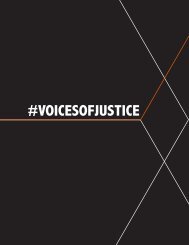Jane Morley – The Justice Hack – Voices of Justice Magazine 2021
A conversation with Jane Morley, QC, Strategic Coordinator with Access to Justice BC, for Voices of Justice, a project that discusses access to justice in British Columbia.
A conversation with Jane Morley, QC, Strategic Coordinator with Access to Justice BC, for Voices of Justice, a project that discusses access to justice in British Columbia.
- No tags were found...
You also want an ePaper? Increase the reach of your titles
YUMPU automatically turns print PDFs into web optimized ePapers that Google loves.
your approach to access to justice issues?<br />
It had an enormous impact on my thinking.<br />
And in part, I think the reason that I went<br />
down this road <strong>of</strong> a restorative approach<br />
to conflict is because <strong>of</strong> what I learned in<br />
that situation. It also left me with a strong<br />
sense <strong>of</strong> the injustice that we as a country<br />
have done in terms <strong>of</strong> our relationship with<br />
Indigenous people. It left me feeling that<br />
that’s a really, really high priority to change<br />
that relationship.<br />
I think that’s part <strong>of</strong> the restorative approach<br />
<strong>–</strong> that the focus is on relationship. That notion<br />
that everything is about relationship is a<br />
characteristic <strong>of</strong> many, if not all, Indigenous<br />
worldviews. Our history as a country is<br />
one <strong>of</strong> colonialism, and we have a wrong<br />
relationship that needs to be righted. <strong>The</strong><br />
point about truth and reconciliation is that<br />
we need to face the truth. And it’s only when<br />
we do that, that we can turn our relationship<br />
around and have a different relationship,<br />
which is not one <strong>of</strong> ‘power over.’ We have to<br />
face the truth first, before we can come to<br />
reconciliation.<br />
Is there any way to reconcile user-centred<br />
design and restorative approaches to<br />
justice with the justice system being,<br />
almost by definition, a system that exerts<br />
‘power over’?<br />
I think there is, because I think the idea <strong>of</strong> a<br />
user perspective is to ask a power question<br />
like, “Who should be benefiting from the<br />
justice system?” And I think we all as lawyers<br />
would answer, “<strong>The</strong> people that the justice<br />
system is supposed to serve.” But the power<br />
in the setup does not necessarily reflect<br />
that. Central to the different approaches that<br />
Access to <strong>Justice</strong> BC has been promoting is<br />
the user perspective. With the user-centred<br />
approach, we turn everything upside down.<br />
<strong>The</strong> system is primarily designed to work<br />
for the service providers than for the people<br />
served. If we start looking at it from the point<br />
<strong>of</strong> view <strong>of</strong> the people served, we come to<br />
different conclusions about how it should be<br />
designed. We also stop being experts about<br />
how it should be designed. If we’re going to<br />
look at it from a user perspective, we need the<br />
users to help us know what that perspective<br />
is. We have to go outside the justice sector to<br />
other disciplines that have knowledge that is<br />
not legal knowledge, but is necessary in order<br />
to understand what a user perspective might<br />
mean.<br />
Do you think there is a difference between<br />
meeting the needs <strong>of</strong> justice system users<br />
and justice?<br />
It is a difficult question. I think they are<br />
different aspects <strong>of</strong> the same thing. If one just<br />
looks at justice as fulfilling the interests <strong>of</strong> the<br />
people served by the justice system, I think<br />
that’s too narrow a view. I do think the idea <strong>of</strong><br />
rights and the rule <strong>of</strong> law are crucial, but they<br />
need to be looked at from the perspective <strong>of</strong><br />
why they are important.<br />
In the case <strong>of</strong> family law, we put children and<br />
families at the centre, and work from there<br />
in order to get justice. I think there’s some<br />
real power issues there. I also am at heart<br />
a traditionalist and I really believe in the<br />
rule <strong>of</strong> law and in the principles <strong>of</strong> justice.<br />
So I don’t think it’s an either-or proposition.<br />
I am quite influenced by a book I read by<br />
Adam Kahane called Power and Love. Both<br />
<strong>of</strong> them are drives that we have as human<br />
beings, the power drive is the drive <strong>of</strong> self<br />
realization, and the love drive is the need<br />
we have to connect with other people. I’ve<br />
become convinced that it’s not an eitheror<br />
proposition with those. You need them<br />
together. To paraphrase Martin Luther King<br />
Jr., he said power on its own is abusive, and<br />
love on its own is anemic. If you want to have<br />
justice in the world, you need those two to be<br />
working together. That’s how you get from<br />
‘power over.’ <strong>The</strong> power doesn’t disappear,<br />
but it’s a power that’s directed towards good<br />
and just things.<br />
#VOICESOFJUSTICE



